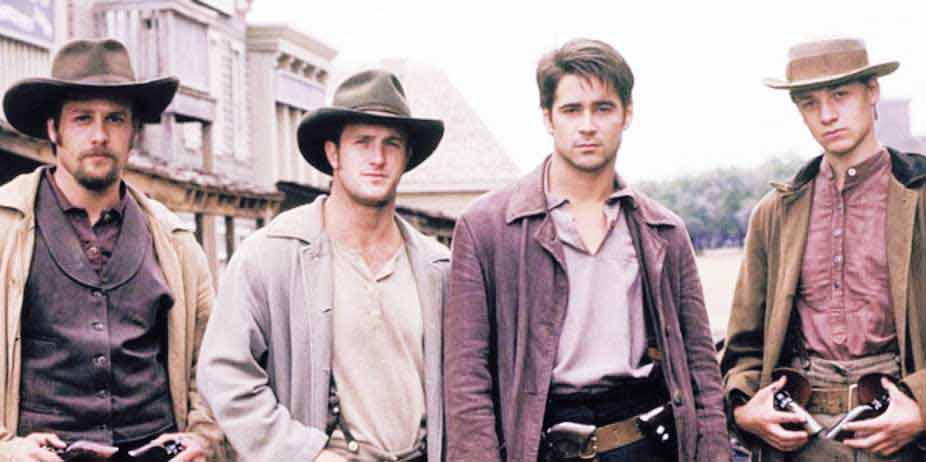
American Outlaws (2001)
Jesse James is notorious throughout history for his bank and train robberies. He and his men stole a lot of money, and shot a lot of people. To many, he's a true-blue American Outlaw. Others try to romantize him into a wronged hero. This film is one of those attempts, and it succeeded. I almost managed to forget my own family's history with the outlaw in the process. Jesse was responsible for stealing my great, great, great grandfather's brand-new boots of his feet as he was returning home. After this film, well, maybe I can forgive him for it.
It's nearly the end of the Civil War. Jesse James and his family, made up of his older brother Frank and the Younger cousins, are fighting unofficially for the Confederacy. But after General Lee surrenders, the boys return home... only to find that the long reach of the law has invaded their quiet little town. With the occupation of the Yankees comes progress, in the form of the Railroad. Investors are asking to buy up all the land around the town, in order to put their new line through. Working with the US government, and employing the private interests of Allen Pinkerton (of the famous Pinkerton Detective Agency), the railroad is using often illegal means to gain participation from the locals.
If you won't sell, you can be evicted. Or shot. Or your house accidentally burned down. That's the way it works. Through intimidation the railroad is slowly eating up the property around the James farm. But Jesse, his mother, and Fred -- along with Cole Younger and his brothers -- refuse to sell. When Cole is further enraged by threats, he looses his temper and shoots several of Pinkerton's men. They arrest him and try him for murder. The town is distraught and furious, but only a few take action. In a daring rescue, Jesse leads a small band of men to save Cole. But when Pinkerton's hired thugs lash out in vengeance, they swear the only way to stop progress is to hold up the railroad's funds. In the meantime, his choice to become an "American Outlaw" endangers Jesse's chances for romance. Constantly on the run, loathed by Allen Pinkerton, and adored by the abused locals, the James-Younger gang rides their way into history books, and on to wanted posters across the nation as they lay waste to railroad property and rob banks across the land.
Granted, I'm not one much for westerns. My dad always loves watching John Wayne and Jimmy Stewart ride into the sunset after shooting the bad guys and winning the girl, but all that idin', shootin' and poker-playin' never appealed to my Victorian England tastes. Until now. Two films tried to bring back classic western tactics to the silver screen. Both failed at the box office, but each have their own merit and sense of fun. Texas Rangers is one. American Outlaws is the other. Both have their flaws, but I enjoyed both as great popcorn movies. Historically, this film's about as true as any other. Forget history and you might think Jesse James was quite the guy. He's likable, wronged, and vengeful. He's an outlaw, a sort of Robin Hood against the big bad Railroad. Allen Pinkerton is portrayed as a crooked political pawn who enjoys the chase, and often results to under-the-table tactics to generate results. But when you have Jesse as a hero, you can't do it any other way. In reality, Jesse James and his gang were villains. But this isn't reality; this is the movies. If you can suspend reality, as I've pointed out, the movie is a lot of fun. It's full of delightfully dry humor and has a few positive values. Jesse and his gang are likable and just gosh-darn cute sometimes. But I'd still like Jasper's boots back.
Sexual Content
Jesse's romance with "Zee" is completely moral and
above-board. He marries her without wanting to fool around first; when he makes
a tongue in cheek comment about "doing something he's wanted to for a long
time," she replies that some things come
after the wedding. There's a coarse joke about one of the guys
having slept with a woman with "a mustache," to which the cousins claim was
really a man (but wasn't). There is some mild innuendo and kissing. Jesse asks
the youngest Younger cousin if he's ever been with a woman, to which the boy
blushingly replies no.
Language:
One harsh abuse of deity (a muffled Jesus), two uses of
GD, and a fair amount of general profanity.
Violence:
The level of violence is very high, but
bloodless and consists mainly of men being shot at and falling over. The film
opens with a Civil War battle in which men are mown down with gunfire; a bank
shoot out involves a main character being killed. Several explosions kill family
members.
Other:
Drinking
